Do you own a restaurant, a franchise chain, or a food manufacturing facility in California? Food processing facilities play a crucial role in society – which is why they undergo strict scrutiny by the government. Under the United States Department of Agriculture (USDA) guidelines, food manufacturing facilities must meet specific concrete flooring requirements from contractor before they can start operations.
We here at Extreme Epoxy Coatings understand the importance of getting it right the first time. One of our team’s main concerns is making sure your concrete floors comply with industry standards for food-grade flooring.
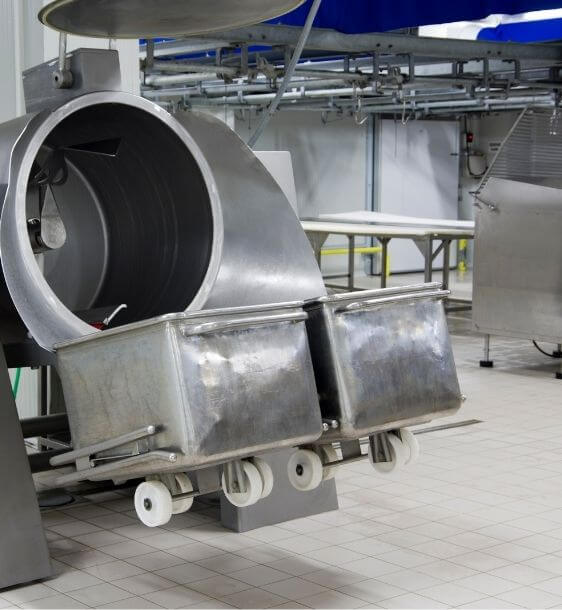
Food Grade Flooring – What Makes It Different?
The food industry demands stricter safety requirements when it comes to food and beverage. Commercial kitchens with constant exposure to hot oil, grease, food chemicals, and raw ingredients need a level of sophistication that minimizes the chances of contamination of the food.
The food industry requires that all food-grade concrete floors are made impervious to water and have a joint-free finish. It should also be coved at the wall junction and strong enough to prevent cracking or erosion after exposure to harsh chemicals. It must also have a long life span with the ability to withstand multiple and persistent cleaning routines. In a restaurant or beverage industry setting, chemical and ingredient spills can happen often. Routine cleaning may help maintain the concrete floors – but it can also speed up the deterioration of the coatings – hence the need for durable floors.
A smooth surface free of cracks isn’t just required to make the floor aesthetically pleasing. The fact is that food processing plants are a haven for mold and bacteria growth. Any cracks or gaps on the concrete flooring can play host to literally millions of microbes that can contaminate the food processing facilities. Worse – the crack serves as a safe harbor so even with hygienic efforts, some of the bacteria can survive. With a smooth and polished surface – there are zero chances for mold, fungi, and bacteria to build up.
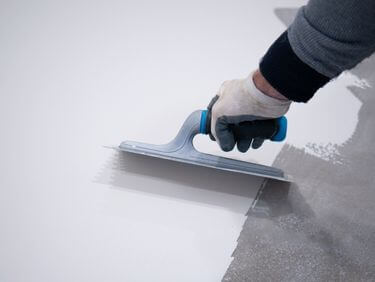
Cementitious Polyurethane Flooring Systems
This type of flooring system is a favorite for food processing facilities that need to maintain high heat for certain processes. It’s typically added on top of concrete flooring to prevent it from cracking due to rapid changes in temperature. They also create a perfect seal that prevents liquid from seeping through the surface and compromising the durability of the flooring. On top of that, this material doesn’t exude odor like MMA.
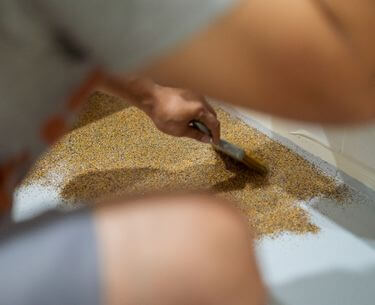
Methyl Methacrylate Flooring Systems
Also known as MMA, this flooring system has a concise curing time of just 2 hours. This keeps the downtime minimal while at the same time providing sufficient protection on the flooring. They’re known for being chemical resistant against both acid and alkali liquid. They also have significant resistance to UV light even at high levels! The only downside of MMA protective coatings would be their smell which is very distinct but not exactly bad. Most buildings with MMA construction have generous ventilation to prevent the scent from overpowering the occupants.

Epoxy Floor Coats
Another popular option is epoxy flooring. They’re available in several colors and could be combined with aggregate to create a bit of friction for your flooring. They’re resistant to organic acids which makes them perfect for a food-focused industrial company. Note though that epoxy offer limited resistance to acid so installation should only be in non-rigorous food processing setups. It also has zero resistance to thermal shock. However, they’re very easy to clean and provide a sealed surface to prevent liquid from sinking onto the concrete. In terms of use, epoxy is perfect for restaurants, diners, small kitchens, break areas, packaging areas, pharmaceutical packaging, and others. It’s also not uncommon to find them used for lobbies, staff rooms, and office space.
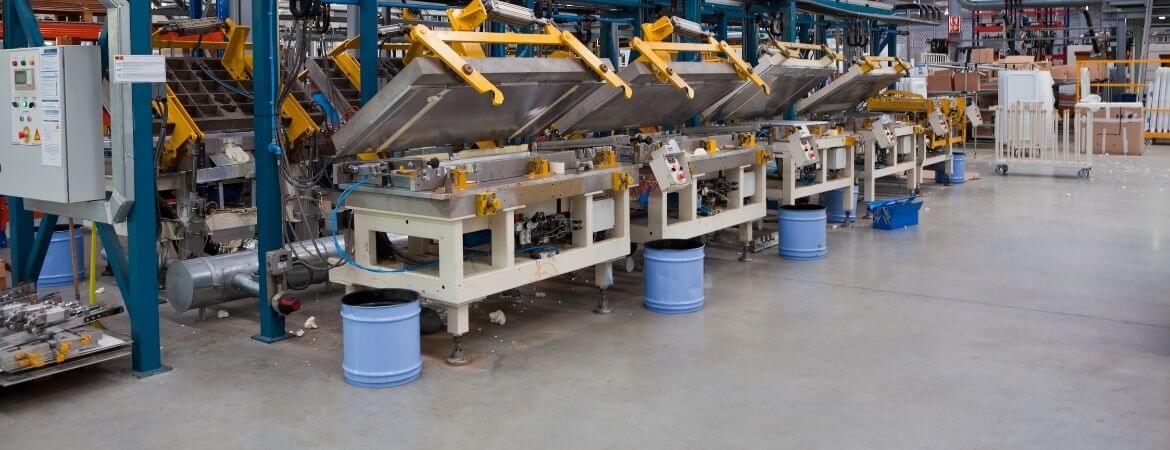
How to Choose Concrete Flooring Contractor for Food Manufacturing
Not all protective coatings are created equal! Your choice would depend on the kind of industry you happen to be in. Here are some important considerations when choosing a floor coating for your food and beverage processing plants:
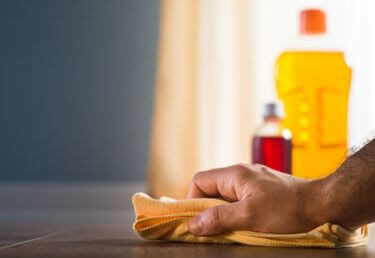
Floor Hygiene
Hygienic flooring can be guaranteed with the use of seamless concrete coatings with zero cracks, dents, or holes. The goal is to create a chemical-resistant surface through a protective seal that perfectly prevents liquid from passing through the concrete floor. The surface should allow for quick and easy cleaning to prevent delays on the processing floor.
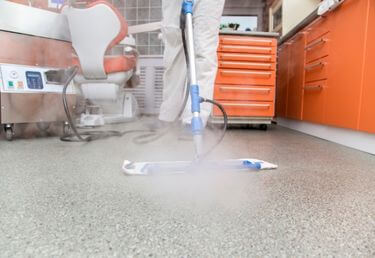
Easy Cleaning
Food industry concrete floors tend to take more abuse than your typical flooring options. As a result, you’d want to have a flooring surface that’s easy, quick, and efficient to clean. This usually means utilizing special cleaning chemicals that can dig deep onto the flooring surface and wipe out every last bit of oil, grease, dirt, and contaminants that might be hovering there.
We advise using a spot test before using any kind of cleaning chemical for the floor. A cleaning routine should also be set in place – complete with the kind of cleaning materials to be used and how often. Fortunately, familiar flooring options already have a set industry standard that you can just follow for maintenance.

Slip Resistance
The last thing you want is for customers or workers to slip and fall on your floor surface. A good industry floor should have a little bit of friction on the surface to create a tight grip between the floor coating and the bottom of your shoes. This is especially true for the food and beverage industry because these industries are prone to spills or wet waste.
Good epoxy floor coating maintains a non-slippery surface without suctioning the water into the concrete. Ideally, food and beverage industries should first check the floor under wet conditions to make sure it’s not prone to accidents.
Keep in mind that concrete floors prone to getting wet should also have an efficient drainage system. Flooring systems should include a proper plan for drainage for easier cleaning.
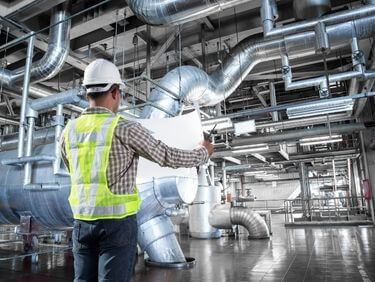
Thermal Shock Resistance
Thermal shock resistance refers to the ability of the food-grade flooring to withstand hot water and steam. This is something decorative flooring is not built for – heavy heat. Food processing plants tend to have an overabundance of grease, oil, dirt, smoke, and chemicals that collect on the surface of the floor and even the walls! Ordinary mopping of the surface is not enough to get rid of all the slime, dirt, and grime that’s accumulated over a number of years.
Commercial food-grade flooring remains durable even after extreme heat. Residential or even low-grade epoxy floors tend to crack, expand, or contract on high heat. For safety purposes, food industries should have floors with excellent durability.
Why Choose Us As Best Contractor
To Install Concrete Flooring For Food Manufacturing in California?
Excellent floor coating goes beyond simply choosing the right construction material for your next project. Even with the best possible coating that money can buy – the poor installation will still leave your company floor prone to cracks, water damage, and needing consistent repair. This is why we pay close attention to the installation process. With years of expertise, our install service follows a precise and perfect system that guarantees seamless installations with zero impact on quality.
All our team members undergo rigorous construction training to guarantee quality production of concrete floors and wall repair. We follow stringent standards with multiple quality checks and consistent contact with our clients to make sure we meet your expectations. Combined with our durable and industry-standard installation equipment – we are confident of our ability to deliver concrete floor and coatings that perfectly fit your needs!
As the top service provider of tough coatings, our commitment to you covers speed, quality, and reasonable pricing. All installations undergo stringent discussions to guarantee that you’re getting the absolute best for your commercial space at reasonable rates.

Part of our service includes:
- exhaustive consultation to discuss the best possible options for your commercial or industrial business building
- multiple coating options depending on the demands of your industry
- an opportunity for growth with repairs and upgrades on pre-existing flooring
Concrete Floors – Direct Team Services
Whether you’re planning for an industrial or a commercial facility – we can guarantee direct and fully-assisted services for your company. Unlike other flooring services, Extreme Epoxy Coatings are 100% hands-on with our clientele. We do not subcontract or have third parties do the job for us. You can be sure that the people you talk with in our office as the sample people who would supervise the service and give you the exact results you want for your business.
Contact Us Today
Contact Extreme Epoxy Coatings today and find out what else we can do for your business! With years of company experience, we have had the privilege of working with several industrial and commercial owners in the area by delivering consistent results with each job. We are more than happy to talk you through our expertise and offer an example of what we can do to create durable floors to meet food industry safety guidelines. Give us a call today and avail your free consult!

